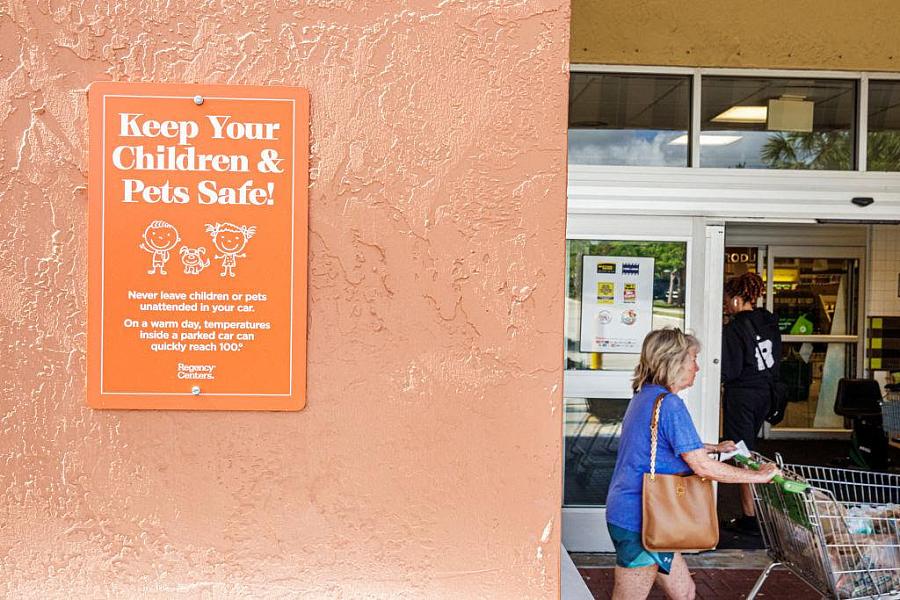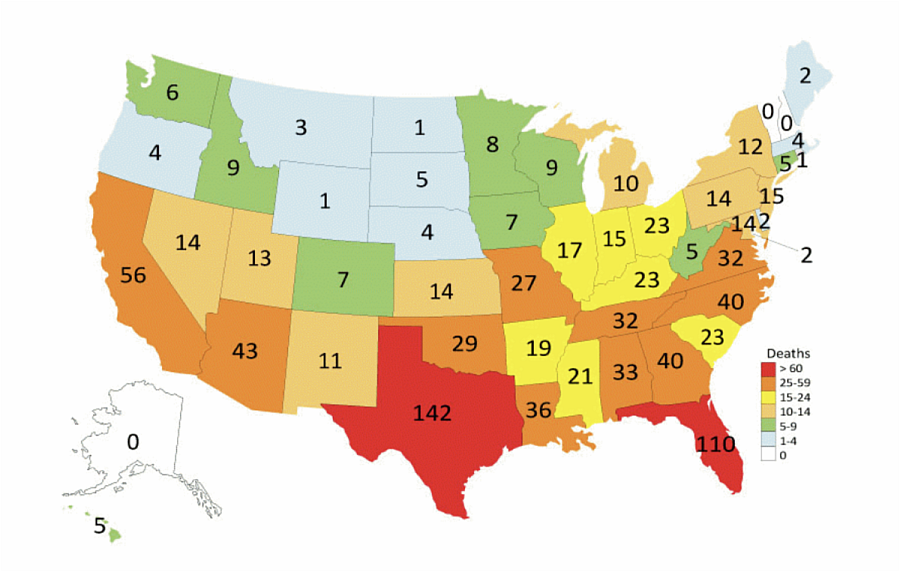The Health Divide: As summers get hotter, too many kids are dying in hot cars

A sign outside a grocery store in Jupiter, Florida, urges people to keep children and pets safe by never leaving them unattended in a vehicle.
(Photo by Jeffrey Greenberg/Universal Images Group via Getty Image)
Every year, an average of 37 children tragically lose their lives due to heatstroke after being left in a vehicle. In both 2018 and 2019, a record number of 53 children passed away after being left in a hot vehicle.
Those figures don’t include the many more near tragedies. On July 14, a 34-year-old South Florida mother briefly stopped at Walmart to pick up a few items for her home. Thinking it would only take 10 minutes, she left her daughter in the car with the window cracked and the ignition turned off. Outside temperatures soared well over 80 degrees.
More than 30 minutes later, Hollywood Fire Rescue broke into the car to remove the child.
Although the child was sweltering hot, she was not hurt and didn’t require any medical attention. Her mother, Anastasiya Motalava, was arrested and charged with one count of child neglect. The Broward County State Attorney’s Office four days later dropped that charge.
“There is insufficient evidence to establish that the defendant's failure to provide her child with proper supervision rises to the egregious level of culpable negligence required for a felony charge of child neglect,” wrote Melissa Kelly, the county assistant state attorney for Broward County, in the memo.
In 2023, there were 29 child hot car deaths, and in 2024, 20 deaths have been reported so far, according to the tracking site NoHeatstroke.org.
Children are more vulnerable to heatstroke in hot cars because their bodies heat up faster than adults. Even on a mild day, the interior of a closed car can quickly reach dangerous temperatures.
While many parents believe that they would never leave their child in a hot car, a researcher who has studied the topic suggests that it's not just a matter of negligence but can also be a failure of memory stemming from stress.
Determining the appropriate charges is essential when these cases come before a prosecutor. While there is no conclusive data on who receives harsher sentencing, one group is compiling information from more than three decades of hot car deaths to determine whether a parent's race and socioeconomic status influence the ensuing charges.
Nearly 1,000 children have died in hot cars since 1998
“There are definitely disparities, seemingly both racial and socioeconomic,” Amber Rollins, director of Kids and Car Safety, a group that tracks the crisis, told USA Today.
Rollins brought attention to a case in which a poor, white mother from Louisiana was charged after accidentally leaving her baby in a car while moving out of a trailer park. The baby passed away. Rollins says that individuals from higher socioeconomic backgrounds had similar incidents in the same area but were not charged.
"It makes no sense at all," Rollins said.
An investigation by USA Today of nearly 180 hot car deaths over the last five years revealed that there were charges brought against at least 36 people of color and 35 white individuals.
Though the numbers appear balanced, it's important to note that whites make up more than 61% of the U.S. population and minorities are less likely to own a vehicle, according to the National Equity Atlas.
Since 1998, a shocking 989 children have died in hot cars, with over half being left behind unknowingly by their caregivers, according to NoHeatStroke.org.

A map of U.S. child deaths in hot cars from 1998 to 2023 the U.S. reveals that the highest number of deaths occurred in Texas, with 142 deaths, and Florida, with 110 deaths. This can be attributed to these states' higher temperatures and large populations, but there have also been fatalities in states with cooler temperatures, such as Wisconsin, with nine deaths, and Minnesota, with eight deaths during that period. These figures highlight the widespread nature of this issue, regardless of regional differences.
Why do parents or caregivers still leave their children in cars despite constant warnings and news stories?
According to David Diamond, a professor of psychology at the University of South Florida in Tampa, no one is immune from leaving a child in a hot car.
“The most common response is that only bad or negligent parents forget kids in cars,” Diamond said. “It’s a matter of circumstances. It can happen to everyone.”
While it is difficult to understand how a person might leave a child behind in a car, Diamond said that in a national online survey of 1,000 parents, about 25% of parents with children under 3 admit to forgetting their child in a car.
The study also showed that dads are three times more likely than moms to leave a child alone in a parked car — 23% compared to 8%.
The concerning phenomenon of children left unattended in vehicles transcends socioeconomic strata and educational attainments. This implies that married white mothers with college degrees are as susceptible as single mothers who have not completed high school, Diamond said.
In 2004, Diamond found that over 100 children had died from being left in hot cars. He developed a hypothesis to explain this phenomenon, based on his expertise as a behavioral neuroscientist, that focuses on the failure of the brain's "prospective memory" system.
“In all of the cases I’ve studied, the parent begins the drive with the plan to bring the child to a destination, but at some point, during the drive, the parent reports having lost awareness of the child in the car” Diamond said. “In these cases, the parent travels directly to the final destination, and in the process, exits the car without awareness that the child is still in the car.”
'Racism is still in play.'
In a case with racial implications, an African American man was charged in May 2016 with second-degree murder after he accidentally left his 8-month-old daughter in the back of his car while he worked.
Joshua Blunt's attorney, Carlos Moore, asked the judge to reduce the charge to culpable manslaughter, but the request was denied.
Blunt, 25, of Grenada, Mississippi, and his fiancée, Shanice Caradine, worked fast food jobs and shared a car. Blunt left work on a break to pick up Caradine and their daughter, Shania. After dropping Caradine off at work, he was supposed to drop Shania off at her grandmother’s house before returning to his job.
However, he forgot and left her in the vehicle.
His coworkers discovered Shania in the car's back seat four hours later. She was rushed to the hospital, where she later died. His bond was set at $250,000.
Moore claimed that Blunt suffered from "Forgotten Baby Syndrome," a condition where caregivers forget their children are in the car. He demanded the charge against his client be dropped, alleging that Grenada County District Attorney Doug Evans, who is white, pursued the manslaughter charge due to Blunt's race.
Moore called Blunt’s arrest a case of "blatant racism," according to a story in The Clarion-Ledger.
When Blunt was released from jail but his charges weren’t disappointed that the city judge did not heed the same prosecutor's motion to amend and reduce the current charge of second degree murder to culpable negligence. This is unprecedented and shows racism is still in play.”
In January 2017, Blunt pleaded guilty to manslaughter to avoid prison time, but now has a felony on his record. He license was suspended for five years, and he was sentenced to 5 years of probation.
That’s a very different outcome from the case I mentioned earlier in Broward County, where Anastasiya Motalava was arrested and a single charge of child neglect was later quickly dropped. The takeaway isn’t that parents shouldn’t be held accountable for these awful acts of forgetting. But the apparent racial disparities in charges is a worrying sign that some parents are being held more accountable than others.

